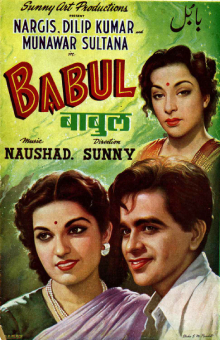
Suraiya Jamal Sheikh, mononymously known as Suraiya, was an Indian actress and playback singer who worked in Hindi films. In a career spanning from 1936 to 1964, Suraiya acted in over 70 films and sang 338 songs. Regarded among the finest and greatest actresses in the history of Indian cinema, she was known for her strong on-screen portrayals in a variety of genres. Suraiya was the most celebrated actress between the mid- to late 1940s and early 1950s and was paid more than her male counterparts.

Shamshad Begum was an Indian singer who was one of the first playback singers in the Hindi film industry. Notable for her distinctive voice and range, she sang over 6,000 songs in Hindustani, Bengali, Marathi, Gujarati, Tamil, and Punjabi languages, among which 1287 were Hindi film songs. She worked with renowned composers of the time, such as Naushad Ali and O. P. Nayyar, for whom she was one of their favorites. Her songs from the 1940s to the early 1970s remain popular and continue to be remixed.

Tun Tun was the screen name of Indian playback singer and actress-comedienne, Uma Devi Khatri, who was called "Hindi cinema's first-ever comedienne".

Andaz (transl. Style) is a 1949 Indian Hindi language romantic drama film, directed by Mehboob Khan, with music by Naushad. The film stars Dilip Kumar, Nargis, and Raj Kapoor in a love triangle, with Cukoo and Murad in supporting roles. The film's music was provided by Naushad and lyrics by Majrooh Sultanpuri. It is the only film to feature Dilip Kumar and Raj Kapoor together onscreen.
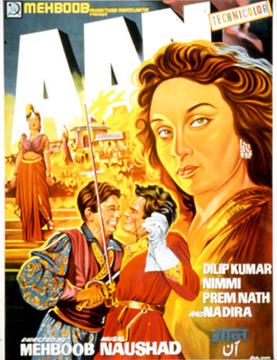
Aan is a 1952 Indian adventure film, produced and directed by Mehboob Khan. It stars Dilip Kumar, Nimmi, Nadira and Premnath.

Nigar Sultana was an Indian actress who worked in Hindi films. She appeared in Aag (1948), Patanga (1949), Sheesh Mahal (1950), Mirza Ghalib (1954), Yahudi (1958), Do Kaliyaan (1968), etc. but she is most notably remembered for playing the role of "Bahar begum" in the historical epic film Mughal-e-Azam (1960). She was the wife of filmmaker K. Asif.

Azaad (transl. Free) is a 1955 Indian Hindi-language action comedy film produced and directed by S. M. Sriramulu Naidu. It was the top grossing Hindi film in the year of its release, and one of the biggest Hindi film hits in the decade. In addition, Dilip Kumar won his second Filmfare Award for Best Actor for his work in this movie.
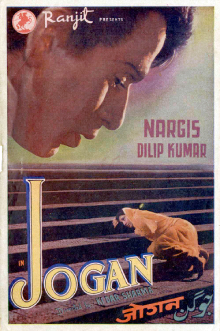
Jogan is a 1950 Hindi–language romantic drama film directed by Kidar Nath Sharma, the film stars Dilip Kumar and Nargis. It features the hit song "Ghunghat Ke Pat Khol" sung by Geeta Dutt. Rajendra Kumar in his film debut plays a small role.

Dil Diya Dard Liya is a 1966 Hindi romance film based upon Emily Brontë's 1847 novel Wuthering Heights. The film is directed by Abdur Rashid Kardar and Dilip Kumar. The film stars Dilip Kumar, Waheeda Rehman, Rehman, Pran, and Johnny Walker. The music is by Naushad. The songs include "Koi Sagar Dil Ko Behlata Nahin", "Phir Teri Kahani Yaad Aayi", "Guzre Hain Aaj Ishq Mein", "Dilruba Maine Tere Pyar Mein". It inspired the 1983 Pakistani film Dehleez starring Nadeem, Shabnam, Afzal Ahmed and Agha Taalish and the 1985 Hindi movie Oonche Log. The film was Dilip Kumar's first outright flop in 15 years at the box-office.
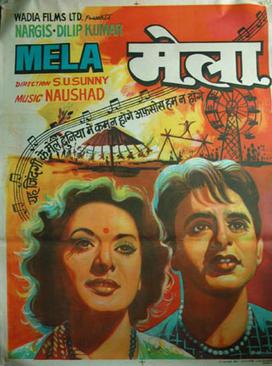
Mela is a 1948 Indian Hindi-language romantic tragedy film. It was produced by and directed by S.U. Sunny for Wadia Movietone. It starred Dilip Kumar, Nargis, Jeevan, Rehman and Nur Jehan. The film's music was composed by Naushad. Mukesh gave playback for Dilip in this film and one of the "Mukesh hits" was "Gaye Ja Geet Milan Ke". Mohammed Rafi's voice was used just once, for the popular song "Ye Zindagi Ke Mele", set in a fairground and picturised on a wandering mendicant at the start of the film. The lyrics of the songs were written by Shakeel Badayuni with story and dialogue by Azam Bazidpuri.

Deedar is a 1951 Hindi-language romantic musical film directed by Nitin Bose, starring Dilip Kumar, Nargis, Ashok Kumar and Nimmi. It is a story of unfulfilled love, where the hero's childhood love is separated from him due to class inequalities. It is one of noted tragedies made in early Hindi cinema. It became a popular film of the Golden era and further established Dilip Kumar as the "King of Tragedy".
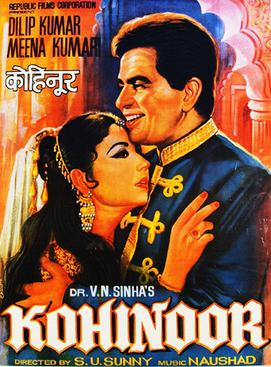
Kohinoor is a 1960 Bollywood action adventure film produced by V. N. Sinha and directed by S. U. Sunny. The film stars Dilip Kumar, Meena Kumari, Leela Chitnis and Kumkum. The film's music is by Naushad. A huge box-office success, it was the third-highest grossing Indian film of 1960.
Dard (Pain) is a 1947 Bollywood drama film directed by Abdul Rashid Kardar. The film was produced by Kardar Productions. It was a surprise "musical hit" at the box office as it had an ordinary star cast. Suraiya played the second lead, with Munawwar Sultana as the main heroine. The film was Suraiya's first "big hit", becoming a popular singing star following the success of the film. The hero of the film was Kardar's brother Nusrat (Kardar), who shifted to Pakistan following Partition in 1947, where he acted in a few films.
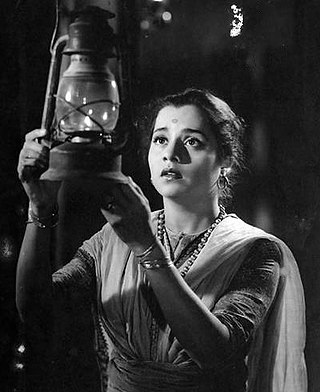
Usha Kiran was an Indian actress. In a career spanning over four decades, she acted in over 50 Hindi and Marathi films, notably Daag (1952), Patita (1953), Baadbaan (1954), Chupke Chupke (1975), Mili (1975) and Bawarchi (1972). She was also the Sheriff of Mumbai during 1996 and 1997.

Leela Mishra was an Indian actress. She worked as a character actor in over 200 Hindi films for five decades, and is best remembered for playing stock characters such as aunts. She is best known for her role of "mausi" in the blockbuster Sholay (1975), Dil Se Mile Dil (1978), Baton Baton Mein (1979), Rajesh Khanna films such as Palkon Ki Chhaon Mein, Aanchal, Mehbooba, Amar Prem and Rajshri Productions hits such as Geet Gaata Chal (1975), Nadiya Ke Paar (1982) and Abodh (1984). Her career's best performance was in Naani Maa in 1981, for which she received Best Actress award at the age of 73.
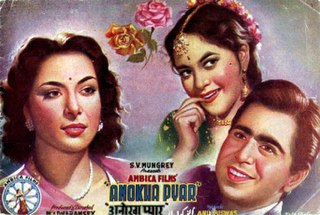
Anokha Pyar is a 1948 Indian Hindi language film. The film stars Dilip Kumar, Nargis, Nalini Jaywant in lead roles. The black and white romantic love triangle was directed by M. I. Dharamsey under the Ambika Films banner. The music was composed by Anil Biswas, who gave a then unknown young Lata Mangeshkar maximum songs to sing for the film. The rest of the cast included Sankatha Prasad, Mukri, Ved, Kesarbai, Habib and Sheikh.

Kanoon also called The Law is a 1943 Indian Hindi-Urdu social film directed by A. R. Kardar. Produced by Kardar for "Kardar Productions", the film is based on a social issue involving an arranged marriage between an older man to a girl who is younger than his son.
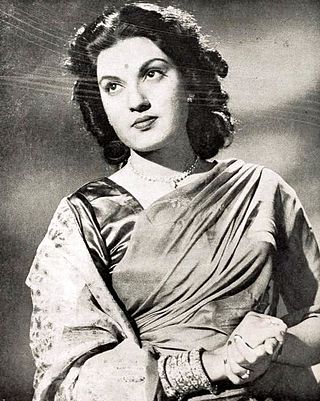
Munawar Sultana was an Indian cinema actress, who acted in Hindi films. She is cited as one of the "popular" actresses of the late 1940s to early 1950s period, along with Noor Jehan, Swarnalata and Ragini. Her specialty was playing a selfless woman, enduring the rough treatment meted by her husband and family, but who eventually "brought her erring husband back home".

Munawar Sultana was a Pakistani radio and film singer. She is known for vocalizing the first-ever hit Pakistani film songs, including: Mainu Rab Di Soun Tere Naal Piyar Ho Gya, Wastae Rab Da Tu Jaanvien Way Kabootra, and Ae Quaid-e-Azam, Tera Ehsan Hay, Ehsan.
